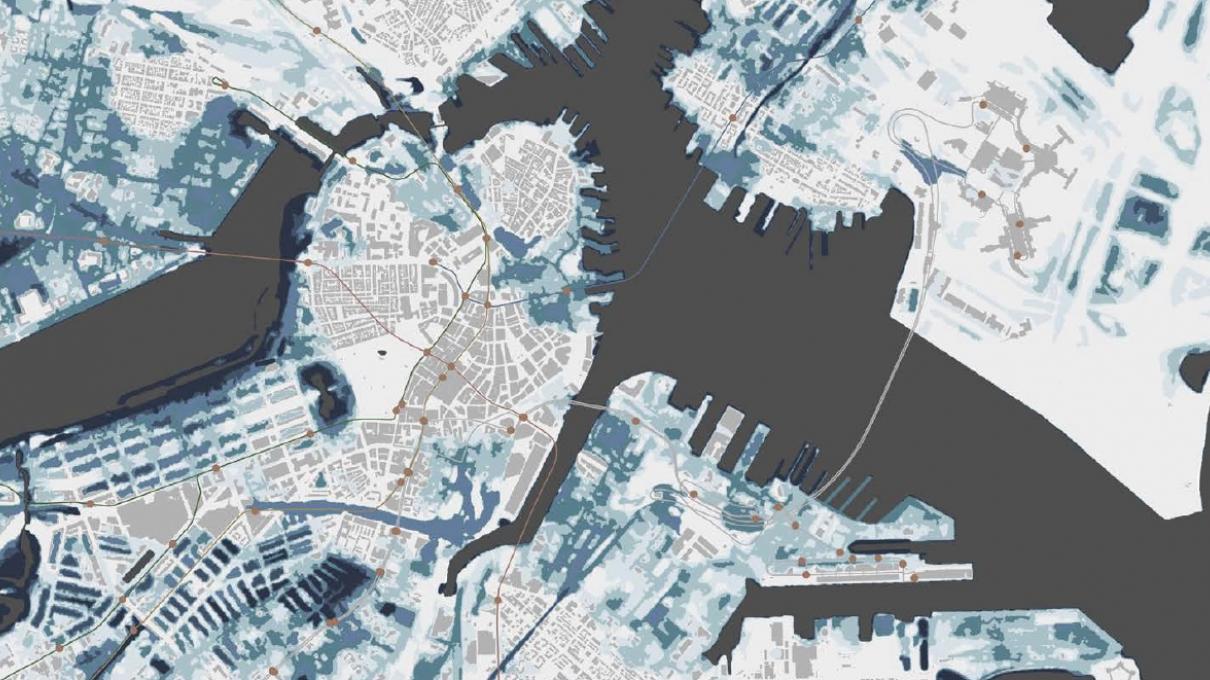Rising Tides: Relocation and Sea Level Rise in Metropolitan Boston

Brent D. Ryan, P. Christopher Zegras, David Vega-Barachowitz, Lily Perkins-High, Victor Rocco, Yafei Han, Menghan Li
With sea levels projected to rise by 2100, and be aggravated by storm surge, cities worldwide are bracing for impacts of global climate change. While much of the existing literature has focused on climate change adaptation, sustainability, and resiliency, far fewer studies have considered the implications of long-term population displacement caused by sea level rise or the necessary policy and planning implications of these anticipated environmental shifts. Using Metropolitan Boston as a case study, this project speculates potential scenarios for long-term climate change displacement and maps strategic principles and procedures that could be adopted as part of a regional relocation strategy for climate change refugees.
Three relocation scenarios, based on rigorous GIS analysis, are considered as part of the study. The three scenarios simulate potential considerations, available and necessary data, and the characteristics of planned relocation and development as a template applicable to the entire region. The Relocation Suitability Index (RSI), a parcel-level data analysis, methodology and decision-making framework, is suggested here as a potential tool for site assessment and local scenarios planning. The study area encompasses the Greater Boston Combined Statistical Area (CSA), including Bristol and Plymouth Counties, as well as the Merrimack Valley cities of Lowell, Lawrence, and Haverhill, which are not part of the Metropolitan Area Planning Council of Greater Boston (MAPC).
The various phases of the project focus on: 1) existing literature review on climate change relocation in an urban design, planning, and public policy context; 2) existing, prevalent paradigms of climate change policy, including market-driven relocation, long-term adaptation, and coastal fortification; 3) five key principles of relocation planning and policy, specifically in the context of three relocation scenarios: in-town relocation, adjacent town relocation, and new town relocation; 4) the ‘Relocation Suitability Index’ (RSI), proposed as a tool for assessment of individual relocation sites (at the parcel level); and 5) application of the RSI to three case studies, which have been selected based on the three relocation scenarios proposed in part three. The RSI translated the five core relocation principles into a tool for site selection using GIS data available through state and regional entities.
Learn More
Han Y, Zegras PC, Rocco V, Dowd M, Murga M. When the Tides Come, Where Will We Go?: Modeling the Impacts of Sea Level Rise on the Greater Boston, Massachusetts, Transport and Land Use System. Transportation Research Record. 2017;2653(1):54-64. doi:10.3141/2653-07
Rising Tides: Relocation and Sea Level Rise in Metropolitan Boston


